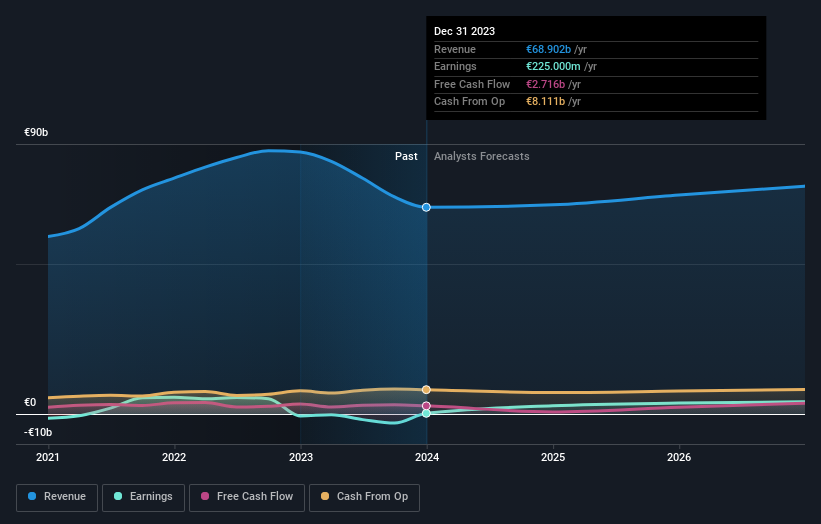Stock Analysis

While not a mind-blowing move, it is good to see that the BASF SE (ETR:BAS) share price has gained 17% in the last three months. But that doesn't change the fact that the returns over the last five years have been less than pleasing. After all, the share price is down 30% in that time, significantly under-performing the market.
Since BASF has shed €1.9b from its value in the past 7 days, let's see if the longer term decline has been driven by the business' economics.
See our latest analysis for BASF
While BASF made a small profit, in the last year, we think that the market is probably more focussed on the top line growth at the moment. Generally speaking, we'd consider a stock like this alongside loss-making companies, simply because the quantum of the profit is so low. It would be hard to believe in a more profitable future without growing revenues.
Over five years, BASF grew its revenue at 8.0% per year. That's a pretty good rate for a long time period. We doubt many shareholders are ok with the fact the share price has fallen 5% each year for half a decade. Clearly, the expectations from back then have not been satisfied. There is always a big risk of losing money yourself when you buy shares in a company that loses money.
You can see how earnings and revenue have changed over time in the image below (click on the chart to see the exact values).

BASF is a well known stock, with plenty of analyst coverage, suggesting some visibility into future growth. If you are thinking of buying or selling BASF stock, you should check out this free report showing analyst consensus estimates for future profits.
What About Dividends?
It is important to consider the total shareholder return, as well as the share price return, for any given stock. The TSR is a return calculation that accounts for the value of cash dividends (assuming that any dividend received was reinvested) and the calculated value of any discounted capital raisings and spin-offs. So for companies that pay a generous dividend, the TSR is often a lot higher than the share price return. In the case of BASF, it has a TSR of -5.9% for the last 5 years. That exceeds its share price return that we previously mentioned. And there's no prize for guessing that the dividend payments largely explain the divergence!
A Different Perspective
It's nice to see that BASF shareholders have received a total shareholder return of 11% over the last year. And that does include the dividend. Notably the five-year annualised TSR loss of 1.1% per year compares very unfavourably with the recent share price performance. We generally put more weight on the long term performance over the short term, but the recent improvement could hint at a (positive) inflection point within the business. While it is well worth considering the different impacts that market conditions can have on the share price, there are other factors that are even more important. Like risks, for instance. Every company has them, and we've spotted 3 warning signs for BASF (of which 1 is concerning!) you should know about.
If you are like me, then you will not want to miss this free list of growing companies that insiders are buying.
Please note, the market returns quoted in this article reflect the market weighted average returns of stocks that currently trade on German exchanges.
Valuation is complex, but we're helping make it simple.
Find out whether BASF is potentially over or undervalued by checking out our comprehensive analysis, which includes fair value estimates, risks and warnings, dividends, insider transactions and financial health.
View the Free AnalysisHave feedback on this article? Concerned about the content? Get in touch with us directly. Alternatively, email editorial-team (at) simplywallst.com.
This article by Simply Wall St is general in nature. We provide commentary based on historical data and analyst forecasts only using an unbiased methodology and our articles are not intended to be financial advice. It does not constitute a recommendation to buy or sell any stock, and does not take account of your objectives, or your financial situation. We aim to bring you long-term focused analysis driven by fundamental data. Note that our analysis may not factor in the latest price-sensitive company announcements or qualitative material. Simply Wall St has no position in any stocks mentioned.

Simply Wall St
About XTRA:BAS
Undervalued with excellent balance sheet and pays a dividend.
